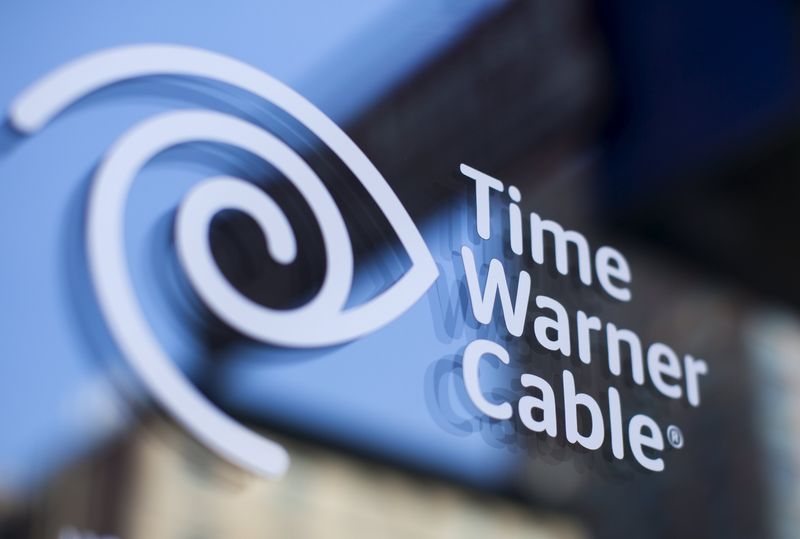By Malathi Nayak and Diane Bartz
NEW YORK/WASHINGTON (Reuters) - Charter Communications Inc (NASDAQ:CHTR), seeking to remake the U.S. cable television industry by acquiring larger rival Time Warner Cable Inc (NYSE:TWC) for $56 billion, will try to skirt the regulatory obstacles that helped sink Comcast Corp (NASDAQ:CMCSA)'s earlier bid for Time Warner Cable.
The combined company would control a big swath of the cable and Internet markets, marking a huge step toward industry consolidation, long advocated by cable pioneer John Malone, Charter's biggest shareholder.
But before that can happen, the Federal Communications Commission will "look to see how American consumers would benefit if the deal were to be approved," said the agency's chairman, Tom Wheeler.
The agreement is the latest example of how cable companies are grappling with declining subscriber numbers as viewers shift to cheaper and more flexible streaming services offered by Netflix Inc (NASDAQ:NFLX), Amazon.com Inc (NASDAQ:AMZN), Hulu and others.
Even premium cable network HBO, owned by Time Warner Cable's former parent, recently started a stand-alone streaming service.
Charter and others have been beefing up their higher-margin Internet businesses through consolidation and partnerships to offset TV subscriber losses.
That market power is likely to be regulators' main focus.The combined companies would control about one-fifth of the U.S. broadband Internet market, according to research firm MoffettNathanson.
The merged company would still be smaller than Comcast, which serves about one-third of U.S. broadband users, said analyst Craig Moffett in a note to clients. He added that "one has to be sober about genuine risks that this deal could still be rejected."
Still, experts said the transaction is different enough from the scuttled Comcast takeover that it is likely to win regulatory approval with certain conditions.
"This is a qualitatively different deal," said Adonis Hoffman, former chief of staff to FCC Commissioner Mignon Clyburn and a founder of Business in the Public Interest think tank.
"The regulatory hurdles will be lower on this transaction primarily because you don't have the same public interest concerns that you had with Comcast, in additional to a smaller total footprint across the nation.
"A VERY DIFFERENT TRANSACTION"
Time Warner Cable's shares rose 7.3 percent to $183.60, still well below Charter's $195.71 cash and stock offer. Charter shares rose 2.5 percent to close at $179.78.
Executives from Charter and Time Warner Cable said concerns were overblown that the deal could face the same opposition as the Comcast takeover did.
"It's a smaller company so some of the concerns that were raised about potential abuses of a larger company don't pertain here," Time Warner Chief Executive Rob Marcus said in an interview.
"It is also the case that we don't have any of the other complications that arose out of Comcast being a vertically integrated media company with a broadcast network, a movie studio, a national cable network," he said.
Consumers Union, the advocacy arm of Consumer Reports magazine, said on Tuesday that Time Warner Cable placed 16th out of 17 companies in its customer satisfaction survey, while Charter ranked 14th.
Charter CEO Tom Rutledge, defending the quality of the company's service in an interview, said its slowest Internet data speed was a swift 60 megabits per second, which it offers for $60 a month. Time Warner Cable's "basic" tier is 10 megabits, initially priced at $30 a month, according to its website.
Rutledge said the combined company would bring back customer service jobs to the United States that have been outsourced to offshore calling centers.
"We plan to use in-house people to do service and transactions, and all that leads to higher quality, which actually reduces costs as your get better customer experiences," he said.
"WILL CABLE PRICES GO UP?"
Comcast walked away last month from the deal to buy Time Warner Cable for $45 billion, citing regulatory concerns.
Now the pressure is on Malone, a 74-year-old billionaire dubbed the "King of Cable," to show that he can complete a deal that slipped away from his larger rival.
The Charter/Time Warner Cable deal would likely be approved by the Justice Department's Antitrust Division but could face conditions at the Federal Communications Commission, said Gene Kimmelman, who worked at the Justice Department.
"It's more of an FCC focus and there they have still a heavy lift. Will cable prices go up? Will broadband prices go up?" said Kimmelman, now president of public interest group Public Knowledge. He added that the regulators' review would also focus on developing Internet video competition.
If the deal is blocked, Charter would be on the hook for a $2 billion break-up fee, the companies said.
Malone, who in the 1980s built a small Denver cable company into the nation's largest cable system, has been outspoken about the need for more consolidation.
He said in 2013 that cable companies should team up to create a rival to Netflix, pooling their money to acquire the kind of content that would be too expensive for a single cable operator to acquire.
As part of the complicated deal, Charter also wins control of Bright House Networks from Advance Newhouse for $10.4 billion. That would help Charter expand in Florida, a market where Bright House has a strong presence.
A combined Charter-TWC would serve large clusters of subscribers in New York, Texas and California. Charter would have the size to undercut telecommunications companies in the lucrative data services market.
